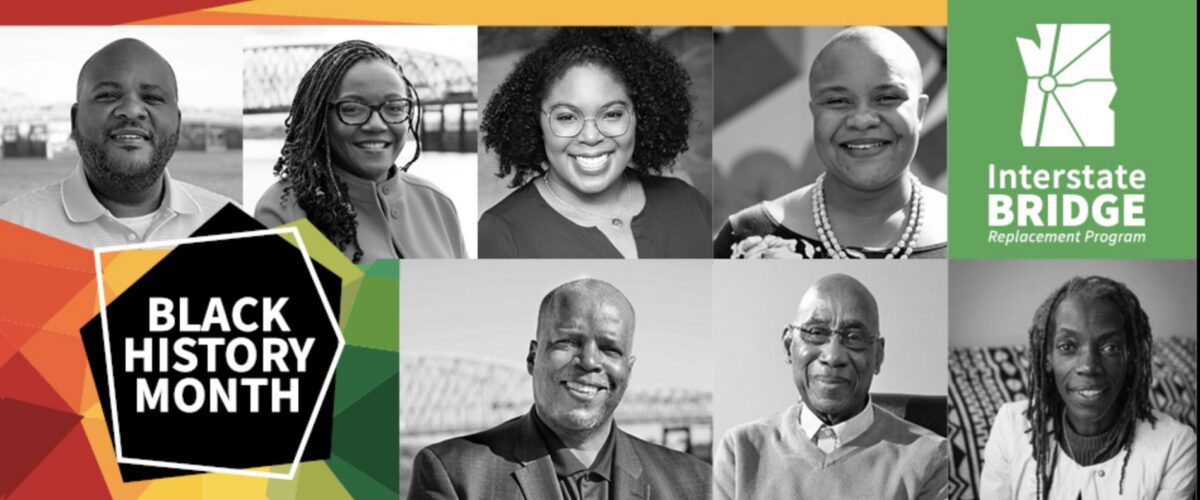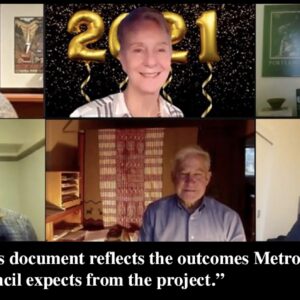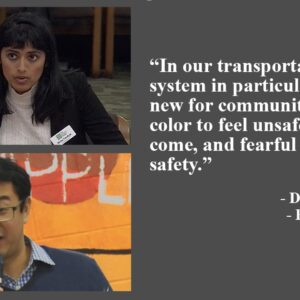
The team behind a project to widen Interstate 5 between north Portland and Vancouver, Washington will host a virtual roundtable later this month to discuss how megaprojects have impacted Black people throughout American history.
Seven people will participate on the panel organized by the Interstate Bridge Replacement Program, which is titled Equity Roundtable: Black Communities and their Relationships with Infrastructure. Among the panelists will be Portland Bureau of Transportation Commissioner and member of the Interstate Bridge Replacement Program Executive Steering Group Jo Ann Hardesty. The others are:
- Ed Washington, Director of Outreach & Community Engagement in Global Diversity & Inclusion for Portland State University and IBR program Community Advisory Group co-chair;
- Jasmine Tolbert, Vancouver NAACP President and IBR Community Advisory Group member;
- Dr. Roberta Hunte, Assistant Professor at Portland State University and IBR program Equity Advisory Group facilitator;
- Greg Johnson, IBR Program Administrator;
- Johnell Bell, IBR program Principal Equity Officer and
- Millicent Williams, facilitator of the IBR program Executive Steering Group, who will facilitate the discussion.
Notably, Williams served as a PBOT division manager and deputy director between 2017 and 2020 before moving into private consulting.
Advertisement
In a statement about the event, IBR Program staff acknowledged the history of racist city planning that has resulted in the displacement of historic Black neighborhoods across the country, including in Portland: “Transportation infrastructure in the United States is fraught with a checkered past of forcing families out of their homes to make way for new construction,” the event’s description says. “The [IBRP] is learning from these past harms to elevate equity-focused practices and bring communities together.”
The IBRP team has been under pressure to address racial equity in its planning process for the bridge. When Metro Council voted to provide necessary funding for the IBRP, which is a controversial project that has sparked protest from climate activists, they listed “advancing racial equity” as a requirement for support.
This event will take place on February 25th from 5:30 to 7:30 pm. Virtual seating will be limited to 40 participants, reserved for BIPOC community members, who will be able to ask questions and interact with the panelists. For people who don’t get a seat, the event will be live-streamed on YouTube and Facebook. You can find out more information and sign up for a seat here.







Thanks for reading.
BikePortland has served this community with independent community journalism since 2005. We rely on subscriptions from readers like you to survive. Your financial support is vital in keeping this valuable resource alive and well.
Please subscribe today to strengthen and expand our work.
Also worth noting that Hardesty has agreed to support the Rose Quarter expansion if buildable covers are provided.
This seems bizarre. I don’t disagree with putting BIPOC folks, who will be disproportionately affected by this (not to mention the racist policies leading up to this point), at the front and allow them to be the ones to ask questions.
But no one else can even watch? I’m not sure I’ve ever even heard the phrase “virtual seating will be limited” before.
Ivan,
I’m pretty sure that means they are only letting 40 people to be panelists and “sit” with their cameras on and be seen in the Zoom meeting. The number of people who can watch is unlimited.
If so that makes a lot more sense. Sorry for not understanding.
The entire committee is staffed with Black people. While these events are advertised as open to the BIPOC community. . . In reality Indigenous people, if they do show up, their voices will not be recognized as “minority” or in having grounded “ownership” in that neighborhood.
NAYA does not push for transport equity policies. Its not been on their agenda for the last few years. Nor do they return phone calls on the matter. Huge gaping whole here. They do not wish to ‘rock the boat’ and unwilling to provide transport equity advocacy.
That’s why I am eternally grateful for the bike advocates here. Doing what needs to be done. We basically have to wait for Kate Brown and Peter Courtney to exit leadership positions before we can get anything done. They are still bitter over Cap and Trade fiasco, the same fiasco Texas is undergoing, is a fiasco we averted here in Oregon.
YOUR WELCOME